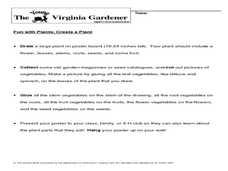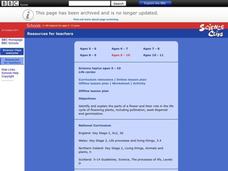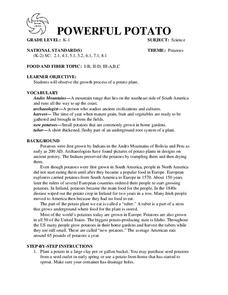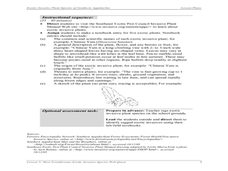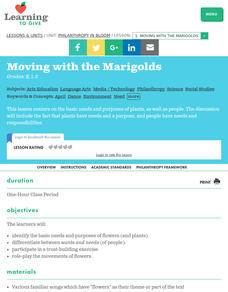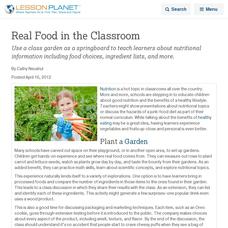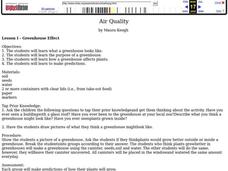Curated OER
The Cycle of Restoration
Pupils describe what is meant by restoration cycle. In groups, they create a poster to show the cycle of restoration work. After presenting their poster, they discuss the actions that can be done for each season. To end the lesson, they...
Curated OER
The Plant Restoration Project
Students discuss Restoration Ecology. They see that restoration can mean removing invasive, non-native plants and replacing them with native plants grown by Students.
Curated OER
The Young Virginia Gardener: Create a Plant
In this gardening worksheet, students draw a plant on a poster board, cutting out pictures of vegetables from magazines and gluing them on the leaves of their drawn plant in the proper places: stem vegetables, fruit vegetables and seed...
Curated OER
A DAY WITHOUT AG
Students consider and discuss the meaning of the word "agriculture" and how agriculture affects their lives every day. Students identify the various ways that agriculture touches their personal lives. Students use worksheets to list all...
Curated OER
Life cycles
Students identify and explain the parts of a flower and their role in the life cycle of flowering plants, including pollination, seed dispersal, and germination. Students recap the following information: that plants need light, warmth,...
Curated OER
Terrariums for Project Pals
Students identify the components needed by plants to survive in the terrarium. In this biology lesson, students build their own terrariums using materials available. They present their project in class.
Curated OER
Partners in Nature
Students role-play how animals and plants depend on and help each other in symbiotic relationships. Working in pairs, they role-play the animals' relationship. They may also choose to draw pictures of these partnerships.
Curated OER
Insects
Students, through books, videos, and readings, explore characteristics of insects. In groups, they choose an insect to research. Students discover their insect's diet, how they move, and where they live. Afterwards, they use the facts...
Curated OER
Vegetable Twister
Learners review vegetables and their nutrient values and production. In this vegetable production worksheet, students read information about the nutrients in vegetables and how they are grown. Learners participate in a game of Twister to...
Curated OER
Air-Plant Interaction
First graders observe, measure, and predict the growth of bean seedlings. They construct graphs of their findings after altering the temperature of the air for the seedlings. They deduct what would happen if the temperature was much lower.
Curated OER
JUST A MATTER OF TIME
Students recognize the dynamic changes in themselves and in agriculture that have occurred through the years. They are shown pictures of a baby or students are asked to think of their little brothers or sisters or themselves in...
Curated OER
Collecting Fossils
In this fossils activity, students will read about the hobby of fossil collecting and the tools needed for collecting fossils. Students will complete 3 short answer questions based on their reading.
Curated OER
Bat Facts
Student's demonstrate an understanding of basic facts about bats by creating a picture representation of bats in their habitat describing information they learned. The lesson plan is especially favorable for visual learners.
Curated OER
POWERFUL POTATO
Pupils will observe the growth process of a potato plant.Plant a potato in a large clay pot or gallon bucket. You may purchase seed potatoes
from a seed outlet in early spring or use a potato from home that has started to sprout. Make...
Curated OER
Children of the Earth and Sky
Fourth graders explore the culture and traditions of Native Americans. After reading "Children of the Earth and Sky," students discuss the lives of Native American children in relation to their own. They create replicas of Hopi...
Curated OER
Utah Indian Contributions
Fourth graders study the contributions from the Utah Indian tribes and present their finding either orally or in a PowerPoint.
Curated OER
Dino Dung!
Students examine how there is more to poop than they think! After reading through material, they answer a series of questions on coprolite, and explore the diet and physical attributes of dinosaurs, as well as their environment.
Curated OER
Soil Research
Third graders work together in groups to discover the importance of soils. Using a worksheet, they answer questions as they surf the internet. They observe three different types of soils and record their observations and use the internet...
Curated OER
Most Troublesome Exotic Invasive Plant Species Web Quest
Students participate in a Web Quest activity in which they identify common exotic invasive plant species of the Southern Appalachian Region. After identifying the top 10 exotic invasive species, they choose one to research in depth.
Curated OER
Moving with the Marigolds
Students identify the basic needs and purposes of flowers. They differentiate between wants and needs of people. They participate in trust building exercises. They role play the movements of flowers.
Curated OER
Sorting
Students experience sorting. In this organization lesson, students play a computer sorting game called "Flood Game" on the "Between the Lions" website. Students visit a library and observe and discuss book organization. Students work in...
Curated OER
Real Food in the Classroom
Use a class garden to teach learners about real food, nutrition, and more.
Curated OER
Stella the Swan
Students study the similarities and differences between ducks, geese, and swans. They tell the story about how water fowl adapt to life in water using props.
Curated OER
Air Quality
Young scholars participate in many activities examining air quality. They examine the purpose of a greenhouse and make predictions. They also collect data and make graphs and charts.




